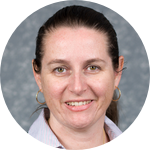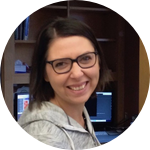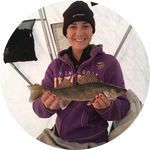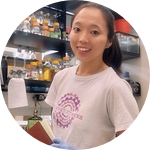Project Results
Expression of apoptosis genes under modeled microgravity conditions occurred earlier and at high levels compared to gravity controls, in particular the expression of genes encoding initiator and executioner caspases. Functional assays of these apoptotic proteases revealed heightened activity under modeled microgravity; however, these increases could be mitigated using caspase inhibitors. The outcomes of this study indicated that modeled microgravity alters the expression of both extrinsic and intrinsic apoptosis gene expression and that this process is mediated in part by caspases. Modeled microgravity-associated increases of caspase activity can be pharmacologically inhibited suggesting that perturbations to the normal apoptosis signaling cascade can be mitigated, which may have broader implications for maintaining animal-microbial homeostasis in spaceflight.
Results revealed that although the onset of the symbiosis was the major driver in the differential expression of NFκB signaling, the stress of simulated low-shear microgravity also caused a dysregulation of expression. Several genes were expressed at earlier time points suggesting that elements of the E. scolopes NFκB pathway are stress-inducible, whereas expression of other pathway components was delayed. The results provide new insights into the role of NFκB signaling in the squid-vibrio symbiosis, and how the stress of microgravity negatively impacts the host immune response. Together, these results provide a foundation to develop mitigation strategies to maintain host-microbe homeostasis during spaceflight.
About This Project
Astronauts experience dysregulated immune function in space that may be related to their microbial communities, but there is a gap in knowledge on how space impacts microbiomes. Our lab investigates the impact of space-related microgravity, or near weightlessness, on the immune response of a simplified model system: a squid and its beneficial bacteria. In this study, we will analyze the gene expression of two innate immune pathways in the squid in relation to their bacteria in microgravity.
Ask the Scientists
Join The DiscussionWhat is the context of this research?
Space flight imposes numerous physical challenges to the human body including dysregulation of the immune system. One area of research that has received little attention is the impact that space flight has on beneficial non-pathogenic microbes that associate with human tissues and regulate various immune responses. In our lab, we use a simplified model system between the Hawaiian bobtail squid, Euprymna scolopes, and its bioluminescent bacterium, Vibrio fischeri, to investigate how beneficial microbes impact innate immune function of their animal host in a space-like environment. This model system has been successfully used in our lab for microgravity experiments and has already been flown into space on the Endeavour STS- 134 and the Atlantis STS-135 space shuttle missions!
What is the significance of this project?
While many studies have investigated the impact of space flight on human physiology & microbial pathogenicity, the effect on beneficial host-microbe interactions and relative immune function has received little attention. The innate immune system is found in all animals, thus the results of this work may be applied to better understand how the immune system of astronauts is affected in space flight, and what role the body's microbial consortium may play in these changes. In addition, by removing gravity as a constant we can address the question of whether gravity obscures aspects or cues of bacteria-induced animal development and innate immune response that may otherwise go undetected under Earth-based conditions.
What are the goals of the project?
We will use the monospecific model between the Hawaiian bobtail squid Euprymna scolopes and its beneficial bacterium Vibrio fischeri to study how mutualistic symbioses are impacted by microgravity. Specifically, we will examine how microgravity alters the expression of squid innate immune system genes in the presence and absence of V. fischeri. All of the experiments with the squid & bacteria in gravity vs. microgravity have been completed and now these experiments are ready to be sequenced. We will extract active transcript RNA (specifically messenger RNA) from the squid in preparation for gene sequencing. The funds raised here will be used for state of the art sequencing technology, NanoString, to achieve high quality and unbiased gene expression data.
Budget
All of the funds needed for completion of this project are associated with the gene expression sequencing objective using NanoString technology. Our lab has designed primers to target up to 50 genes associated with innate immune pathways that will be adapted to the NanoString CodeSet and multiplexed for sequencing. The reagent master kit includes the reagents necessary for NanoString sequencing (1 master kit = $1,190; we need 2 master kits). Sample preparation of the bacteria and squid for NanoString will be done in our lab.
All quality data analysis will be conducted by us, Maddie and Lexi, using free NanoString software.
Additional funding for conducting experiments with the squid and bacteria prior to sequencing was provided through a Space Grant Consortium Dissertation Improvement Award (Lexi) and a Florida Space Grant Scholarship (Maddie).
All microgravity experiments are completed and awaiting to be sequenced!
.
Endorsed by
 Project Timeline
Project Timeline
Once we have secured funding for sequencing we will be able to prepare the samples for NanoString sequencing.
Jan 18, 2018
Project Launched
Apr 02, 2018
Begin processing samples
Apr 16, 2018
Ship samples to NanoString sequencing center
Apr 30, 2018
begin analyzing NanoString sequencing results
Meet the Team
Affiliates
Affiliates
Team Bio
We work in Dr. Foster's lab at the Space Life Sciences Lab on Merritt Island, FL near Kennedy Space Center as Ph.D students of the Microbiology & Cell Sciences Department at UF. Broadly, our research focuses on i) investigating the mechanisms by which beneficial microbial symbionts drive innate immune processes in an animal host, ii) impacts on health and physiological development, and iii) how microgravity influences the homeostasis of these host-microbe interactions.
Alexandrea (Lexi) Duscher
I am currently a PhD candidate at the University of FL. I finished my undergraduate degree in Marine Science at Eckerd College in St. Petersburg, FL. I first started working in Dr. Foster's lab as a post-baccalaureate on marine stromatolites and transitioned into the squid project for my PhD.
I enjoy working on the squid in space project because I am able to combine an extremely interesting and well studied marine model system with an aspect of science I had never before considered studying, space biology.
While my fellow squid-mate Maddie is focused the specific immune pathway of apoptosis in the squid I am more focused on the response of the squid's innate immune cells, hemocytes, in response to simulated microgravity. Previous work in our lab has found that hemocyte migration into the blood sinus of the light organ, the site of symbiosis between the squid and V. fischeri, is delayed in simulated microgravity and never reaches the same levels as gravity controls, indicating a delay in the response of innate immune cells in microgravity. I am focused on a specific innate immune pathway that may trigger the activation of the hemocytes.
Using NanoString technology I want to investigate the activity of genes relating to a putative hemocyte activation pathway to determine if this pathway is the reason for the delay of hemocyte migration in microgravity conditions. This work will help us better understand how innate immune cells are impacted in a space-like environment.
Outside of work I try to take advantage of the beautiful FL weather by surfing, hiking, and camping. I also enjoy talking about science with the community and am active in the Skype a Scientist program as well as a mentoring program with Maddie that targets young women interested STEM at University of Central Florida called Pegasus Express.
Maddie Vroom
I am currently working on my Ph.D research at the Space Life Sciences Lab under Dr. Jamie Foster. I received my B.S in Microbiology from Ohio Wesleyan University in May of 2016.
My current work involves elucidating how a modeled microgravity environment affects programmed cell death, or apoptosis, in the epithelial tissues of juvenile Euprymna scolopes that are colonized by Vibrio fischeri. While apoptosis is typically thought of as an innate immune response to infection, it is also implicated heavily in physiological development and the maintenance of healthy tissue. In the squid, apoptosis produces a developmental change in the juvenile light organ where the V. fischeri bacteria live and this process is ultimately induced by colonization - the process in which the V. fischeri bacteria establish themselves as inhabitants of the squid. Previous work from our lab has shown that apoptosis is enhanced in microgravity. The scope of my current work is to determine why and how, from both the perspective of the bacterial symbiont and the animal host.
With NanoString I plan to look at how apoptosis-related genes are differentially expressed for uncolonized and colonized squid in gravity versus microgravity. Combined with bacterial studies, the data generated from Nanostring will help me tease out the extent and mechanism(s) by which each respective symbiotic constituent contributes to the enhanced apoptosis that has been observed in a space-like environment.
Outside of work I enjoy going on runs, kayaking around 1000 Islands, and volunteering at the local elementary school and health clinic. I am also active in the Skype a Scientist program as well as a mentoring pilot program for undergrad women interested in STEM called the Pegasus Express, which is sponsored by Moonshot Mentoring and the Florida Space Grant Consortium.
Additional Information
The results of this study will be published in a peer-reviewed journal(s) and presented at national and international meetings.
We would like to emphasize that while both of us work with the squid-vibrio model system to study symbioses in a microgravity environment, we are looking at different innate immunity pathways/genes. Thus, the funding for Nanostring sequencing will contribute substantially to both of our individual dissertations.
Donation incentives:
$5: Squid in Space patch magnet from the first mission that put cephalopods into space!

$20: Adopt a baby squid! We will send you a picture of one of our baby squids that you get to name!
$30: Custom crocheted squid pin!
.jpg)
$100: custom handmade Bobtail Squid Inc wallet/ business card holder
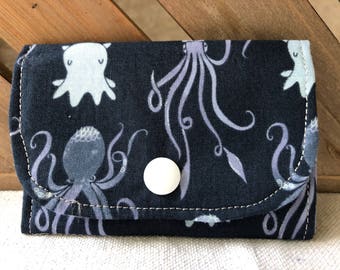
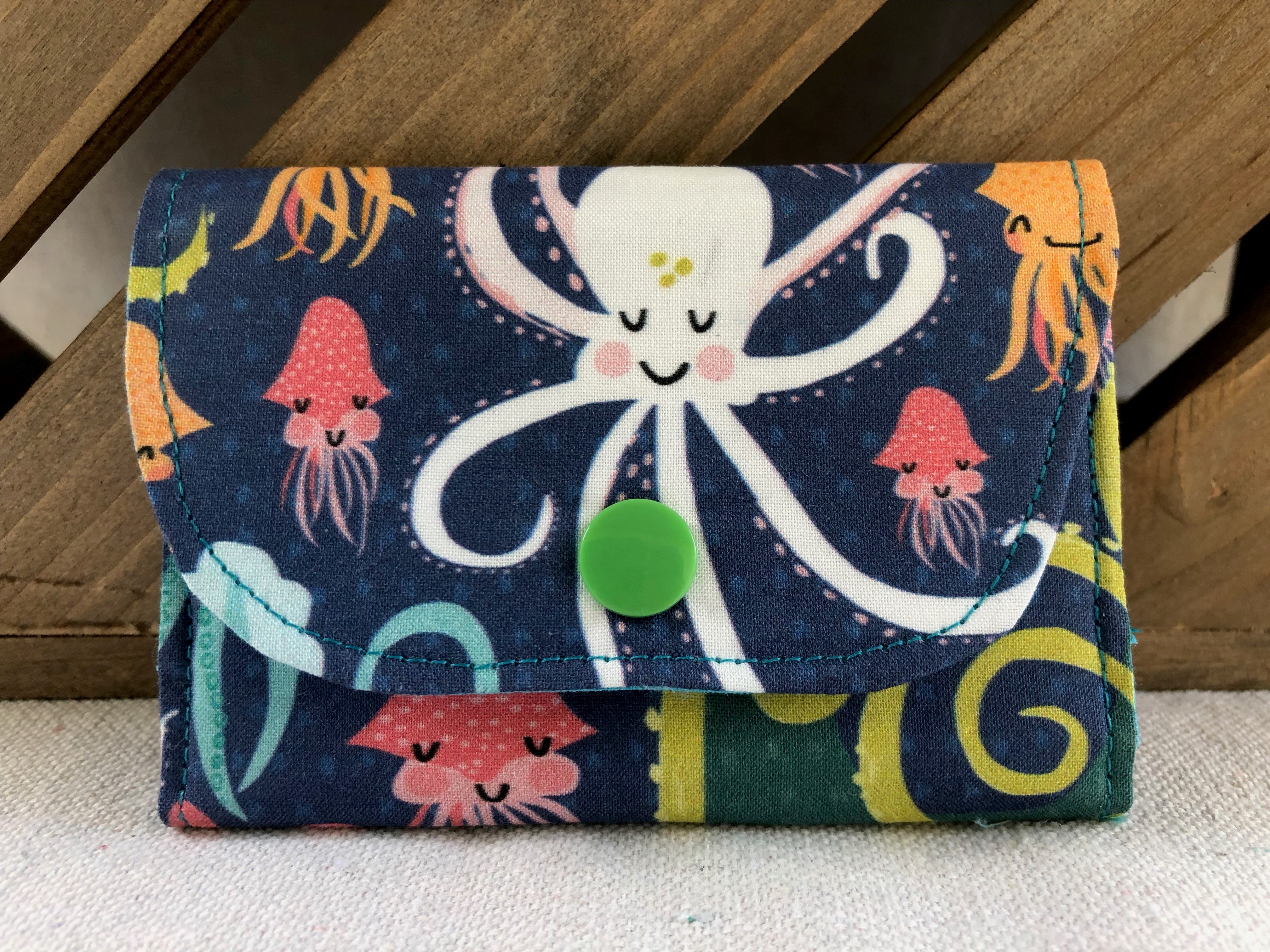
$200: custom handmade Bobtail Squid Inc pouch
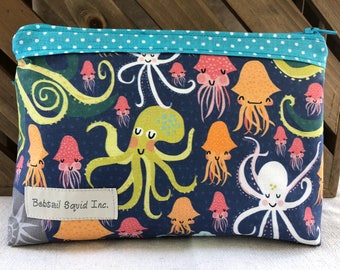
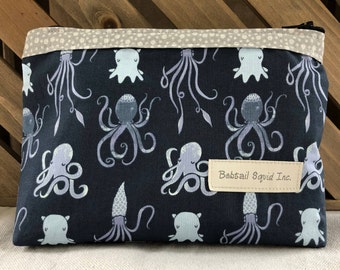
Project Backers
- 163Backers
- 115%Funded
- $8,400Total Donations
- $51.53Average Donation
